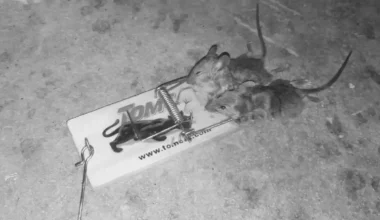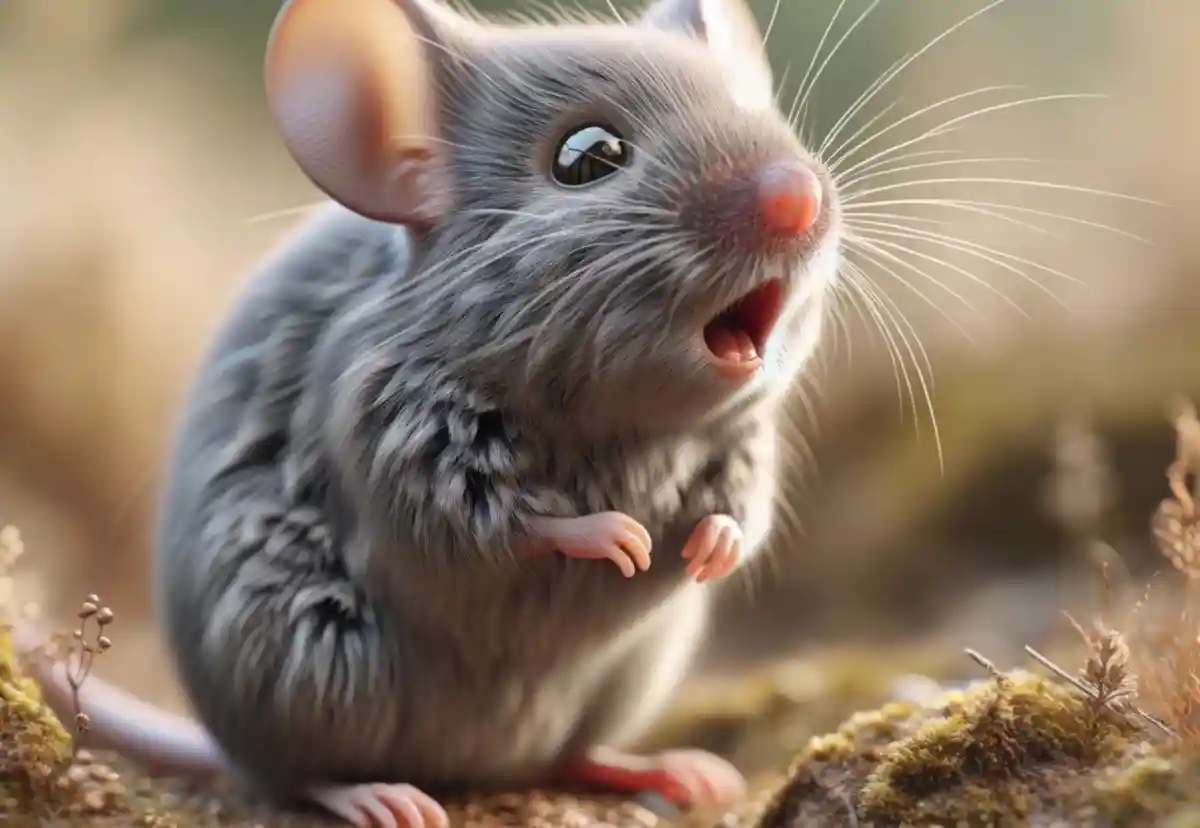A wild mouse is known for its agility and quickness when hiding from potential predators. However, a wild mouse not running away is generally due to factors such as illness, injury, or being frozen in fear.
Wild mouse not running away and reasons

Some of the reasons the wild mouse you encounter won’t run away include:
1. Illness critter
Whether an adult or a baby wild mouse, it could be that it is ill. Mice suffering from illness may not have the energy to flee when confronted with danger. Moreover, they may have a reduced sense of awareness, which makes it tougher for them to detect potential threats.
Suppose a wild mouse has a serious infection or a neurological disorder. It may be unable to respond to stimuli the same it would without sickness. If necessary, you should visually examine if the critter has a disease.
2. The mouse is injured
Injury is a reason a wild mouse will not run away from you. A mouse suffering an injury, such as a broken limb, is not in the right condition to flee, making the critter more vulnerable to predation and other threats. Unfortunately, an injured mouse may be in pain, causing it to freeze in your presence.
3. Fear of being killed
A wild mouse may not run away from you out of fear. In some cases, it could play dead until you leave. Mice are prey animals whose survival relies on their ability to detect and avoid threats. If the pesky mouse freezes in fear and is unable to respond to stimuli, it could be due to a traumatic experience, such as being caught by a predator or handled by humans, causing the mouse to associate the situation with danger.
4. Used to seeing humans
If a wild mouse won’t run away, it could be because it is accustomed to humans. Mice in cities accustomed to human presence may fail to perceive humans as a threat. As such, the mouse simply does not recognize you as a threat. Feeding wild mice, for example, is one of the reasons they associate humans with food. Note that even indirect feeding of wildlife can also lead to serious conflicts between people and wildlife, per the Division of Agriculture and Natural Resources, University of California.
5. Too young to flee
The wild mouse could be a baby and simply too small to run away. Baby mice, like all young animals, are still developing and growing, and their muscles and coordination may be incomplete. They can take weeks or months to reach a size and level of physical development that allows them to run.
Should you touch a wild mouse?
A wild mouse should not be touched. While it may appear to be harmless, touching a wild mouse poses serious health risks. Moreover, they can bite and scratch you, causing injury and potentially transmitting diseases.
Mice have been linked to many diseases transmittable to humans, including hantavirus, Lyme disease, and salmonellosis. Hantavirus is potentially fatal and is transmitted to humans through infected mice’s urine, droppings, or saliva while Lyme disease is caused by bacteria spread by the bite of infected ticks carried by mice. Salmonellosis, on the other hand, is food-borne caused when humans consume food contaminated with mouse droppings.
Do note that wild mice can cause allergic reactions in some people. Per Elizabeth Matsui in the publication Management of Rodent Exposure and Allergy in the Pediatric Population, “children with asthma who are both sensitized and exposed to high mouse allergen concentrations at home are at greater risk for symptoms, exacerbations, and reduced lung function.” Other allergies include sneezing, itching, and redness.
Mice have their own natural habitats and should be allowed to thrive and maintain their populations. Do not interfere with them to avoid disrupting their populations.
Keeping fearless wild mice at bay
These tiny critters can cause property damage, contaminate food, and transmit diseases harmful to you, your household, and your pets. Thus, you want to prevent wild mice from wandering into your property in the first place.
Seal the cracks
Mice can fit through small cracks and openings in walls, windows, and doors. In fact, a mouse can get through a small, 6-7 mm hole. You want to seal the possible entry points to keep them outside. Consider using silicone caulk, and make sure to tightly close your windows and doors.
Eliminate food sources
Food attracts mice in the first place, and they can go to any lengths to obtain it. Store food in airtight containers. Make sure all crumbs see cleaned up and keep your kitchen counters and floors clean. Lastly, take out the trash regularly.
Declutter your home
A wild mouse found its way into your property due to the mess and clutter as these provide hiding places and potential food sources. Regular cleaning and tidying can help keep mice at bay as it takes away the needed comfort from your home.
Set mouse traps
Consider using humane mouse traps to catch mice. Place the traps in areas where you notice mouse activity and check them regularly. If you catch a mouse, be sure to properly dispose of it because it can carry diseases whether dead or alive. Avoid sticky traps, as you may have to humanely kill the critter yourself.
Use deterrent
There are several mouse deterrents available with all-natural components like cinnamon or peppermint oil. Get them and spray these repellents throughout your property for their unique potent smells to deter mice from coming inside.
Conclusion
If you suspect an infestation, contact a pest control expert. Pest control professionals have the skills and tools to locate mouse access points and use the appropriate controls to keep them at bay.






